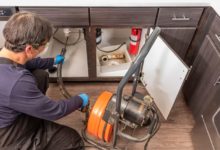
The Ultimate HVAC Maintenance Checklist for Homeowners
Regular HVAC maintenance is essential for keeping your heating and cooling systems running efficiently and effectively. Regular maintenance not only ensures your HVAC system operates efficiently but also helps extend its lifespan and reduce energy costs. By understanding and performing basic maintenance tasks, homeowners can prevent expensive repairs and maintain a comfortable home environment throughout the year.
Below, we’ll provide a comprehensive HVAC maintenance checklist for homeowners.
Regularly Replace Air Filters
Air filters play a critical role in maintaining indoor air quality and ensuring the efficient operation of your HVAC system. These filters trap dust, pollen, and other airborne particles, preventing them from entering your home and clogging your system. Over time, filters become dirty and clogged, reducing airflow and forcing your HVAC system to work harder. It not only decreases efficiency but can also lead to higher energy bills and potential damage to your system.
Hence, to keep your HVAC system running smoothly, it’s important to replace air filters regularly. Most experts recommend changing the filter every one to three months, depending on factors such as the type of filter, the presence of pets, and overall air quality. Check the filter monthly and replace it if it looks dirty or clogged. Using the right type of filter for your system is also crucial. High-efficiency particulate air (HEPA) filters are excellent for trapping smaller particles, but make sure they are compatible with your HVAC system.
Professional AC Installation and Inspection
Proper air conditioning installation is crucial for the efficient operation and longevity of your HVAC system. When installing an air conditioning unit, it’s important to hire experts to ensure the job is done correctly. Professional installation guarantees that the unit is properly sized and configured for your home, which helps prevent future problems such as inefficient cooling, frequent breakdowns, and higher energy bills. Additionally, experts can identify potential issues that may not be apparent to the untrained eye.
Once your air conditioning system is installed, regular professional inspections are essential to maintain its efficiency. A qualified technician can check for any signs of wear and tear, ensure that all components are functioning correctly, and perform necessary adjustments or repairs. Scheduling annual inspections can help detect and address minor issues before they become major problems, ultimately saving you money and extending the lifespan of your system.
Clean and Inspect Ductwork
Clean ductwork is essential for efficient airflow and maintaining good indoor air quality. Over time, dust, dirt, and other debris can accumulate in your ducts, reducing airflow and forcing your HVAC system to work harder to heat or cool your home. Additionally, leaky or damaged ducts can cause conditioned air to escape, leading to higher energy bills and uneven temperatures throughout your home.
Inspecting and cleaning your ductwork regularly can help prevent these issues. Start by visually inspecting the ducts for signs of dust buildup, mold, or damage. If you notice any issues, it may be time to clean the ducts. While you can clean the vents and accessible parts of the ductwork yourself, professional duct cleaning is recommended for a thorough job. Professionals have the tools and expertise to clean the entire duct system, seal any leaks, and ensure your ducts are in good condition.
Check and Clean the Outdoor Unit
The outdoor unit of your HVAC system, often called the condenser unit, plays a crucial role in the cooling process. It is exposed to the elements, which means it can easily become clogged with dirt, leaves, and other debris. This buildup can restrict airflow and reduce the unit’s efficiency, causing it to work harder and potentially overheat. Regularly checking and cleaning the outdoor unit is essential for maintaining optimal performance and preventing costly repairs.
To clean the outdoor unit, first, ensure the power is turned off to prevent any accidents. Clear away debris like leaves, grass, and twigs from around the unit. Use a garden hose to carefully rinse off dirt and dust from the fins, ensuring the water pressure isn’t too high to avoid bending or damaging them. Inspect the unit for any visible signs of damage, such as rust or bent fins, and take care of these issues as soon as possible. Keeping the area around the outdoor unit clear and clean will help maintain its efficiency and extend its lifespan.
Test Thermostat Settings
The thermostat is the control center for your HVAC system, regulating the temperature and ensuring your home remains comfortable. If your thermostat is not working correctly, it can lead to inefficient heating and cooling, resulting in higher energy bills and uneven temperatures. Regularly testing and adjusting your thermostat settings is a simple yet effective way to maintain optimal system performance.
Begin by testing the thermostat to ensure it accurately reflects the current temperature in your home. If you notice any discrepancies, it may be time to recalibrate or replace the thermostat. Consider upgrading to a programmable or smart thermostat, which allows you to set temperature schedules and remotely control your HVAC system. These advanced thermostats can help you save energy by automatically adjusting the temperature based on your daily routine.
Read more The Dual Threat: Exploring the Impact of Pests on Health and Property Value in Richmond Hill
Schedule Seasonal Maintenance
Scheduling seasonal maintenance with a professional HVAC technician is one of the most important steps you can take to ensure the longevity and efficiency of your system. Seasonal maintenance typically involves a comprehensive inspection and tune-up of your HVAC system, addressing any issues before they escalate into major problems. It is recommended to schedule maintenance at least twice a year—once before the cooling season and once before the heating season.
During a seasonal maintenance visit, a technician will perform various tasks, such as checking refrigerant levels, inspecting electrical connections, lubricating moving parts, and cleaning coils. They will also test the system’s overall performance and efficiency, ensuring that it is ready to handle the upcoming season’s demands. Keeping a maintenance log to track these visits and any repairs or replacements can help you stay organized and proactive about your HVAC care. Regular professional maintenance not only improves your system’s performance but also helps you avoid unexpected breakdowns and extend the life of your HVAC unit.
Conclusion
By investing in professional AC installation and inspection, regularly replacing air filters, cleaning and inspecting ductwork, maintaining the outdoor unit, testing thermostat settings, and scheduling seasonal maintenance, you can prevent major issues and enjoy a comfortable home environment. Regular maintenance not only enhances the performance of your HVAC system but also extends its lifespan and saves you money on energy bills and costly repairs.






